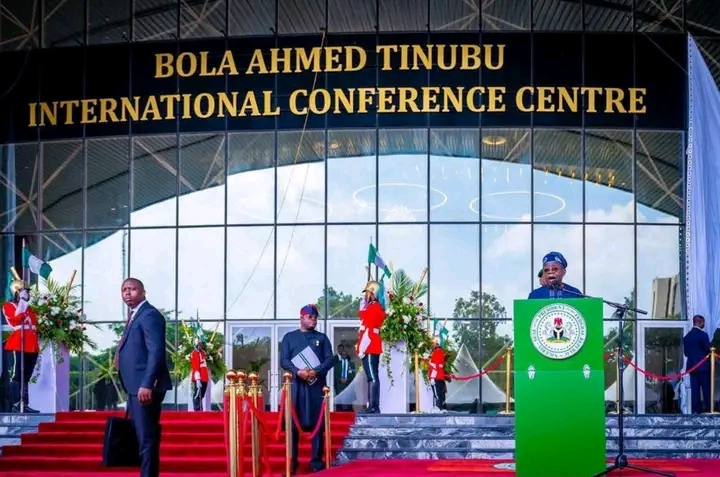EDITORIAL
In a country where memory is often sacrificed at the altar of political vanity, the decision by the Minister of the Federal Capital Territory, Nyesom Wike, to rename the Abuja International Conference Centre (AICC) after President Bola Ahmed Tinubu is not just an act of poor taste, it is a disturbing desecration of public legacy.
The AICC was conceived and constructed during the military administration of General Ibrahim Badamasi Babangida and officially opened in 1991. It was designed as a national and continental symbol, a venue for diplomacy, governance, and intellectual exchange, with its architectural sophistication representing Nigeria’s aspirations as a regional leader. The entire complex reportedly cost under ₦1 billion at the time, a sum which, adjusted for inflation and the prevailing economic indices of the early 1990s, was a reasonable investment for such a monumental structure.
Fast forward to 2025: the centre was renovated, not reconstructed, just renovated, and Wike tells Nigerians it now rivals any facility in the world. The catch? The renovation reportedly ran into several billions of naira, a staggering figure given the nation’s current economic collapse, with inflation in double digits, minimum wage stagnant, debt servicing consuming the federal budget, and millions sliding deeper into multidimensional poverty.
Yet, the most galling part of this story is not even the cost, it is the decision to rename this national monument after the sitting president, Bola Tinubu, whose only contribution to the AICC was approving its refurbishment. It was not Tinubu who conceptualized it, designed it, or commissioned it; that credit goes to Babangida’s administration, which, despite the imperfections of military rule, built national structures without the narcissism of slapping their names on them.
What Wike has done is emblematic of the worst kind of political eye service, a culture of excessive flattery and sycophancy that places personal ambition and proximity to power above historical truth and institutional respect. In the name of Tinubu’s “Renewed Hope Agenda,” Wike has erased the original spirit of a national monument and repackaged it as a billboard for political relevance.
This trend is not new in Nigeria, but Wike’s execution of it is particularly brazen. Having spent the better part of the last election cycle holding his own party (PDP) hostage, only to cross over and emerge as one of Tinubu’s most visible allies, Wike has mastered the art of political survival through disruption. Now, as FCT Minister, he is trying to transplant the same brand of politics that brought Rivers State to the brink, a desperate bid to control his state by proxy and dictate terms to a sitting governor, all to preserve personal influence.
The Tinubu comparison is instructive. Since leaving office as governor of Lagos in 2007, Tinubu has maintained a tight grip over the state’s politics, allegedly determining successors, dominating state resources, and building a political empire with himself at the apex. Wike appears to be replicating that model in Rivers, with similar consequences: instability, infighting, and the gradual erosion of democratic norms.
But beyond the politics of personality, the renaming of the AICC is an affront to Nigeria’s institutional memory. It raises a fundamental question: who really owns public monuments? Is it the people, whose taxes fund these projects, or the transient politicians who occupy office? There must be limits to what public officials can rename or claim credit for. By international standards, the naming of public infrastructure after individuals typically follows strict criteria: significant, measurable contribution to national development; a legacy tested over time; and in many cases, posthumous recognition to ensure historical objectivity.
In the United States, for example, the naming of airports, libraries, or government buildings after former presidents and public figures follows congressional deliberation, public consultation, and is rarely, if ever, done while the individual is still in office. In the United Kingdom, monuments bear the names of those who shaped history, not those who merely approved repairs. Even in many African countries, such practices are treated with caution, to protect public institutions from being turned into personal relics.
What Nigeria witnessed this week was not just a building getting a new signpost. It was another example of how public space is politicized, public memory manipulated, and public officeholders glorified for doing the bare minimum. Approving renovations is not an extraordinary achievement, it is a duty. Naming a monument after the president for that is an insult to taxpayers and an erasure of the country’s architectural and political heritage.
If every minister renamed a bridge, road, school or stadium after the sitting president for merely doing what is expected, we would have nothing left named after anyone but the occupants of Aso Rock. And yet, this cycle continues, because too many public servants would rather serve power than serve the people.
The Abuja International Conference Centre belongs to Nigeria, not to Tinubu, and certainly not to Wike’s ambitions. To rename it in this manner is not an honor, it is a betrayal.
© Eye Reporters Media Ltd 2025.
All Rights Reserved. For inquiry or submission contact editor@eyereporters.com; eyereportersmedia@gmail.com Or Call +2348052898434
For advert placement and inquiries, publication of press releases, and news coverages, please call: Phone: 08052898434 Email: editor@eyereporters.com, click here to view the advert rates.



